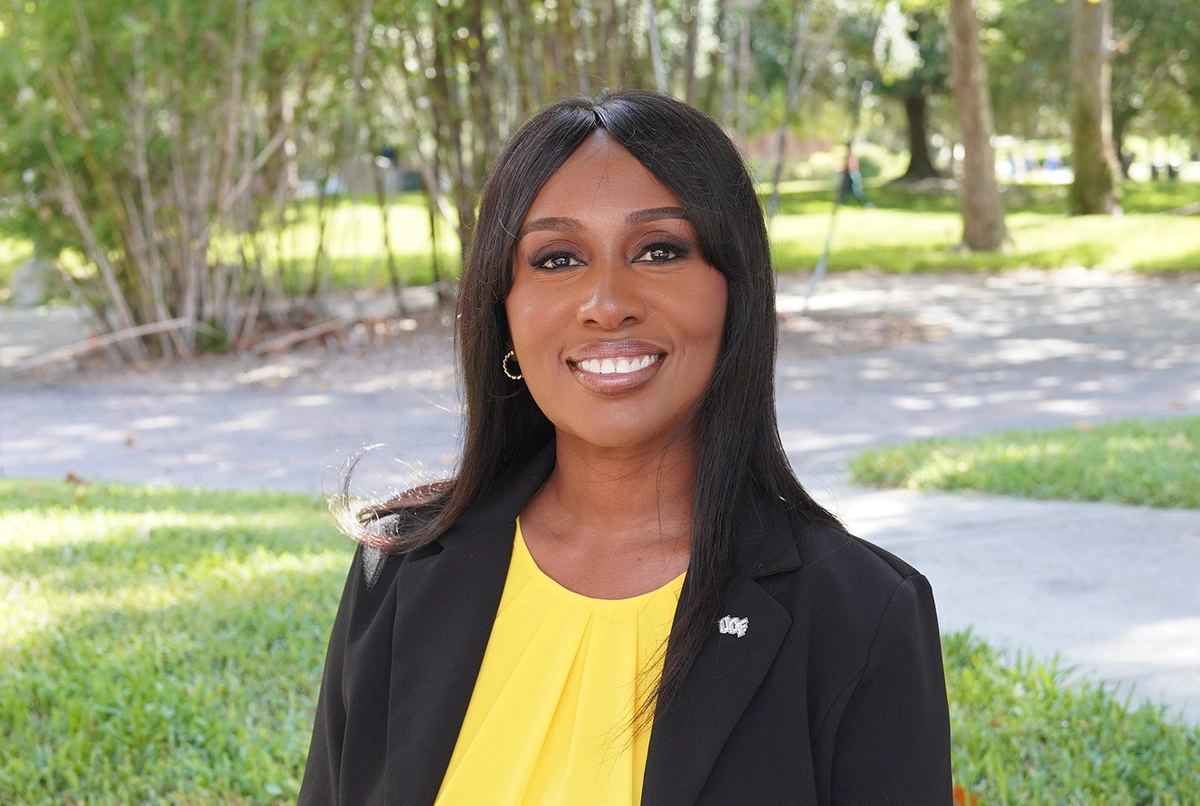The Society for Information Technology and Teacher Education honored Earlisha Whitfield with the Emerging Leader Award at the National Technology Leadership Summit.
BY NATALIE FEDOR

Earlisha Whitfield was honored as an Emerging Leader for her early career dedication and potential to become a leader in her education field. (Photo by Natalie Fedor)
In just her second year as an assistant professor of reading education in the School of Teacher Education, Earlisha Whitfield has been honored with an Emerging Leader award from the Society for Information Technology and Teacher Education for her dedication to improving literacy through access to technology.
The Emerging Leader award, presented at the National Technology Leadership Summit, is awarded to early-career faculty and researchers who have demonstrated the potential to become leaders in their chosen education-related field. Faculty who are fewer than five years post-doctoral completion are eligible for the award.
In her award application, Whitfield spoke about her contributions to promoting literacy, especially those involving access to instructional technology for literacy development. Her passion and research primarily focus on reading education, how to address the issue of equitable literacy practices in the classroom, and how newer technology and educational software can assist.
As part of the award, Whitfield was invited to attend the National Technology Leadership Summit, which brings together approximately 50 national leaders in education and educational technology for two days of working sessions that address pressing issues in education. Attendees of this invitation-only summit include presidents of educational associations, editors of educational technology journals, directors of non-profit foundations, federal policymakers and corporate representatives. This year’s summit was held in person in Washington, D.C., on Sept. 19 and 20.
Whitfield grew up in Baton Rouge, Louisiana, where she served as a K-8 literacy instructor for 18 years and as school administrator for six of those. She saw early on in her education career how issues with literacy often went hand-in-hand with lack of access to resources and technology.
“I was teaching when Hurricane Katrina hit New Orleans, Louisiana, and Baton Rouge is where a lot of families went after they were displaced after the hurricane, and my class size grew to maximum capacity to ensure inclusion of those displaced students," she says. “That's how a lot of issues started to come about regarding access to technology for students in my class.”
That experience inspired her to write a grant to bring in technological resources to help improve her community, which allowed her to secure around $30,000 to help bring technology and instructional resources to high-poverty, low-performing schools.
“Each one of the schools in which we got the technology and instructional resources improved significantly, to the point where they achieved a state award,” Whitfield says. “They improved their literacy through those programs that we had in place. We had literacy leaders to provide opportunities for the students to work on iPads and on computers, doing individualized programs that helped them in their literacy development.”
Now, she is excited to speak about these issues on a much larger scale, with the conference giving her an opportunity to brainstorm with executives and higher-level researchers in education. In the future, she hopes to write a grant to create a literacy lab or a community hub that would facilitate access to literacy applications or individualized instruction software that can personalize reading instruction to students’ current reading levels.
“It means a lot to me to be able to be the voice for the voiceless,” she says. "To be able to come from working with students in the schools and moving to a platform of working with executives, senior-level researchers, and other people who make decisions about these issues makes me feel like I have an impact.”
Whitfield says the support she has received here at UCF as an early-career faculty member was very helpful in preparing her to apply for and achieve this award.
“The programs for early career faculty in the College of Community Innovation and Education have been invaluable in helping me be recognized for this award. What I've learned in one year at UCF through all of the programs that are available for early-career faculty helped get me to where I was able to compete on a national level and be recognized for this award,” she says. “The support I've received from the dean’s office, the research office, and my director has been instrumental in advancing my research and academic career, which has given me the opportunity to impact change on a larger scale. I am deeply appreciative of their support and guidance.